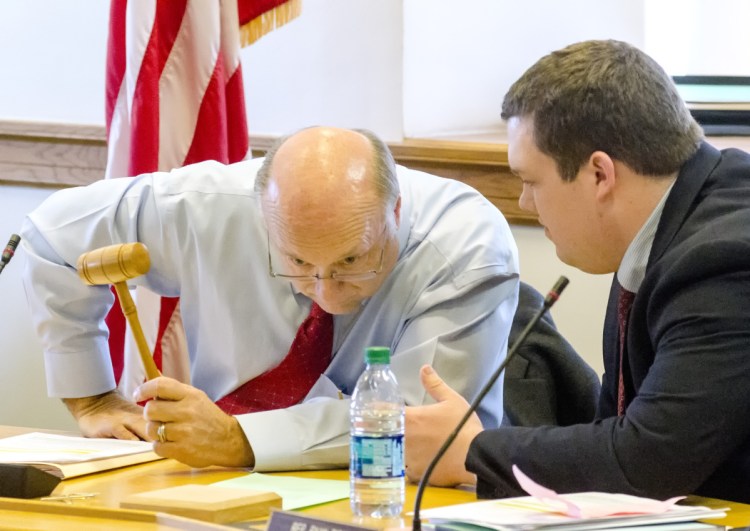AUGUSTA — A legislative committee voted Tuesday to give Bath Iron Works $60 million in tax incentives as long as the company maintains current employment levels and invests at least $200 million in the shipyard.
After weeks of discussion and fine-tuning, members of the Taxation Committee voted 8-2 in support of a bill that BIW officials said will help the company compete for Navy contracts. The controversial proposal will allow BIW to receive up to $3.5 million in tax credits – with the total not to exceed $60 million over 20 years – but would scale back those incentives if employment fell below 5,500 workers or eliminate them if the company fails to invest $200 million.
“I’m supporting this tax credit because we need to assist all of our employers, but certainly one with such a specialized workforce with specialized skills,” Rep. Gay Grant, D-Gardiner, said after working on a bipartisan compromise on the tax credit bill. “We have to have some state investment in this most important sector of our economic development and our future.”
But the bill continues to face opposition from individuals and lawmakers who regard it as “corporate welfare” to a shipyard owned by one of the world’s largest defense contractors, General Dynamics.
“If your parent company is making $3 billion in profits, you’re not the one who needs a tax break,” said Sen. Justin Chenette, D-Saco. “And I am very uncomfortable moving in that direction to provide a taxpayer handout to a company that can afford it.”
Over the past 20 years, BIW has received $60 million in state tax incentives under a custom-made program intended to encourage the Bath shipyard to invest in facilities and hire workers. BIW officials are quick to point out that the company invested roughly $500 million in the sprawling shipyard during that period, more than double the $200 million required by the earlier tax incentives package.
The bill now headed to the full Legislature for consideration would offer a similar deal but contains more robust reporting and accountability measures, according to supporters and company officials.
For instance, BIW would become eligible for the first $30 million in tax breaks only after making an initial $100 million investment “related to construction, improvement, modernization or expansion.” The company would need to invest another $100 million to qualify for up to $30 million in additional tax credits over the second decade of the program. Additionally, the amount of credits granted to the company annually would gradually decline if total employment fell below 5,500 and would be eliminated altogether if employment dips below 4,500 workers.
With roughly 5,600 workers today and an estimated payroll of $350 million, BIW is the fourth-largest private employer in the state. Along with Huntington Ingalls shipyard in Mississippi, BIW builds the guided-missile destroyers that are regarded as the workhorses of the Navy fleet. But BIW lost a sought-after Coast Guard cutter contract in 2016, and competition between BIW and Ingalls is intensifying as the Navy puts more emphasis on the per-unit price of ships that cost more than $1.5 billion to build. Navy officials have signaled that it may not evenly divide the current 10-ship contract between the two yards.
The proposed tax breaks have sparked dozens of letters to the editor in publications around the state, however, and drawn sizable crowds to the Legislature’s Taxation Committee room.
A core group of vocal opponents of BIW’s request for tax credits have attended every committee meeting on the bill and urged lawmakers in the hallways to reject a measure they decry as corporate welfare. But on Tuesday, dozens of BIW employees and supporters converged on the State House hours before the committee’s start time and claimed nearly every seat in the small committee room, thereby forcing opponents to wait outside or listen in an adjacent room.
Although clearly intended to send a signal to committee members, BIW’s display of support angered the activists opposed to the tax breaks and critical of the shipyard’s solitary focus on building warships.
“Clearly BIW seems to be very fearful of us having any representation at all,” said Connie Jenkins of Orono. “I think it’s very interesting that they felt the need to fill the (committee) room.”
One protester, Bath resident and veteran Bruce Gagnon, has been fasting for roughly three weeks to illustrate his opposition to the bill. Gagnon said he’s lost 15 pounds and has been subsisting entirely on water, fruit juices and broth.
“I’m a very stubborn person and I’m going to keep going,” Gagnon said while leaning up against a wall outside the committee room.
Gagnon and other opponents have said Maine needs that $60 million to pay for schools, roads and other social services programs. The two lawmakers who voted against the measure on Tuesday – Chenette and Rep. Janice Cooper, D-Yarmouth – were also skeptical of BIW’s assertions that the tax incentives were needed to help the shipyard compete for contracts with Huntington Ingalls. Mississippi’s legislature is currently considering a proposal to spend $45 million in bond revenues on capital investments for the Ingalls shipyard, which is located on state-owned land.
“We cannot compete with Mississippi,” Cooper said. “Mississippi is a bigger state and it’s also dirt-poor. They spend their money on incentives instead of education, instead of roads, instead of all of the things that make Maine the place that we want to live. And I just don’t want that to happen to our state. We have to approach this question as far as where our priorities are.”
Taxation Committee members have tweaked the bill to include additional reporting requirements and added the graduated “deceleration” of tax credits if BIW’s total employment falls below 5,500 workers. Additionally, the amended bill will require the state’s watchdog agency, the Office of Program Evaluation and Government Accountability, to complete an evaluation of the tax credit program by August 2024.
Rep. Stephen Stanley, a Medway Democrat, recalled how he and more than 5,000 other people used to work at the Great Northern Paper mills in the Millinocket area. But those mills and jobs are now gone, Stanley said, because of ownership changes and lack of investment.
“Investment is the key here because, without investment, you have no jobs,” said Stanley, who worked in the paper mills for 43 years.
Send questions/comments to the editors.





Comments are no longer available on this story